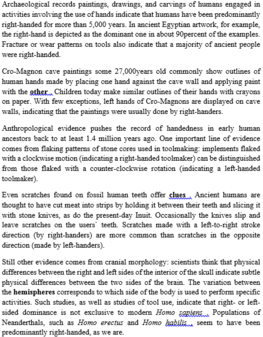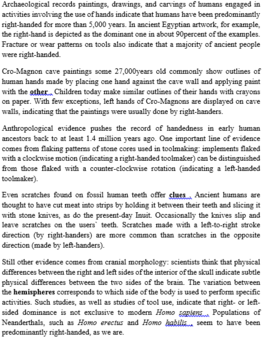Read the following passage and mark the letter A, B, C or D on your answer sheet to indicate the correct answer to each of the following questions from 31 to 38.
What does it take to graduate from university with a First?
Mark McArdle, first–class degree holder from the University of Lancaster, tells how he did it.
Don’t spend too much time at the student lounge, do turn up for most lectures and tutorials and do submit all coursework – eventually. That, I was told by a PhD student during fresher’s week, was all I needed to do to get a 2:2. For a 2:1, I’d require a better attendance record and have to work harder, but not at the expense of being cut off from civilization. And for a First I would have to become some sort of social outcast, go to even lecture and tutorial (scribbling notes madly), spend every waking moment immersed in academic books, and be among the last to be thrown out of the university library at 10 pm closing time.
Well, I did not give up my life for study. I didn't attend every lecture and tutorial. I didn’t write down every word spoken in lectures. I didn’t get 80% or more in every essay, project, test or exam. I was usually behind with my reading and occasionally mystified by the syllabus. Sometimes I couldn't be bothered to go to university and stayed at home instead. But I always knew where I was what I had to do and what not to bother with. And I always worked hard on the things that counted: assignments and exams.
Getting a degree is about learning, but it isn’t just about learning biology, history, English or whatever. It’s about understanding what you need to succeed − what, in fact, the university wants from you and what you will get in return. You have to have a feel for the education market and really sell your inspirations. What does the lecturer want? What is the essay marker searching for? Some students try to offer something not wanted. Others want to give very little − they steal the thoughts of others and submit them as their own. But they all want to be rewarded. Exchange, but don’t steal, and you’ll get a degree.
I could guarantee every book on my reading list was out on long loan from the university library within five seconds of the list being issued. This was worrying at first, but I quickly learned that it was impossible to read all of the books on an average reading list anyway. I sought shortcuts. Collections of selected readings or journal articles were excellent sources that often saved me the bother of reading the original texts. References in books dragged me all over the place but with all the courses I had to do, there wasn't enough time to be dragged too far. I would flick through the book, read the introduction, note any summaries, look at diagrams, skim the index, and read any conclusions. I plucked out what was needed and made my escape.
I revised by discarding subject areas I could not face revising, reading, compiling notes, and then condensing them onto one or two sheets of A4 for each subject area. Leading up to the exam, I would concentrate on just the condensed notes and rely on my memory to drag out the detail behind them when the time came. I didn’t practice writing exam questions, although it was recommended. I prefer to be spontaneous and open–minded. I don't want pre–formed conclusions filling my mind.
And nor should you; there is no secret to getting a First – this is just an account of how I got my First. Be a happy student by striking the right balance between working and enjoying yourself. Take what you do seriously and do your best. And, no matter what you do don’t forget to appreciate every day of your university studies: it is one of the greatest periods of your life.
Glossary:
University degree classifications in the UK:
– First class
– Upper second (2:1)
– Lower second (2:2)
– Third class (3)
The word “flick through” in paragraph 4 is closest in meaning to _______.
A. search quickly
B. skim
C. borrow
D. read carefully





Kiến thức: Đọc hiểu
Giải thích:
flick through = read quickly: đọc lướt qua
search quickly: tìm kiếm nhanh skim = read quickly: đọc lướt qua
borrow: mượn read carefully: đọc cẩn thận
Thông tin: I would flick through the book, read the introduction, note any summaries, look at diagrams, skim the index, and read any conclusions.
Tạm dịch: Tôi sẽ lướt qua cuốn sách, đọc phần giới thiệu, ghi chú mọi tóm tắt, xem sơ đồ, đọc lướt qua mục lục và đọc bất kỳ kết luận nào.
Chọn B
Dịch bài đọc:
Làm gì để được tốt nghiệp đại học với tấm bằng hạng Nhất?
Mark McArdle, người giữ bằng cấp hạng nhất của Đại học Lancaster, cho biết ông đã làm như thế nào.
Đừng dành quá nhiều thời gian tại phòng chờ sinh viên, phải tham dự hết các bài giảng và các buổi hướng dẫn và cuối là nộp hết các loại bài tập. Một nghiên cứu sinh nói với tôi điều này, và nó chỉ là tất cả những gì tôi cần làm để có được bàng hạng 2:2. Đối với bằng hạng 2:1, tôi yêu cầu thành tích tham dự tốt hơn và phải làm việc chăm chỉ hơn, nhưng không phải trả giá bằng việc bị loại khỏi nền văn minh. Và để dành được tấm bằng hạng Nhất, tôi sẽ phải trở thành một kẻ bị xã hội ruồng bỏ, tham gia mọi buổi giảng bài và hướng dẫn (viết nguệch ngoạc một cách điên cuồng), dành mọi khoảnh khắc thức giấc đắm chìm trong sách học thuật, và là một trong những người cuối cùng bị tống ra khỏi thư viện trường đại học vào lúc 10 giờ tối – giờ đóng cửa.
Chà, tôi đã không từ bỏ cuộc sống của mình để học. Tôi đã không tham dự tất cả các buổi giảng và hướng dẫn. Tôi không viết ra từng chữ trong các bài giảng. Tôi cũng không đạt từ 80% trở lên số điểm của các bài luận, dự án, bài thi hay bài kiểm tra. Tôi thường không hoàn thành việc đọc của mình và đôi khi bị nhầm lẫn bởi giáo trình. Đôi khi tôi còn không bận tâm đến việc đến trường và ở nhà. Nhưng tôi luôn biết mình đang ở đâu, mình phải làm gì và không nên bận tâm điều gì. Và tôi luôn làm việc chăm chỉ với những điều quan trọng: các bài tập và các bài kiểm tra.
Lấy được một tấm bằng là về việc học, nhưng không chỉ là học về sinh học, lịch sử, tiếng Anh hay bất cứ thứ gì. Nó là về việc hiểu những gì bạn cần để thành công – trên thực tế, trường đại học muốn gì ở bạn và bạn sẽ nhận lại được gì. Bạn phải có cảm nhận về thị trường giáo dục và thực sự bán cảm hứng của bạn. Giảng viên muốn gì? Người chấm bài tiểu luận tìm kiếm điều gì? Một số sinh viên cố gắng đưa ra những điều không cần thiết. Những người khác muốn cho rất ít – họ đánh cắp suy nghĩ của người khác và gửi chúng như của chính họ. Nhưng tất cả họ đều muốn được khen thưởng. Trao đổi, nhưng không ăn cắp, và bạn sẽ có được một tấm bằng.
Tôi có thể đảm bảo mọi cuốn sách trong danh sách đọc của mình đều được cho mượn từ thư viện đại học trong vòng năm giây sau khi danh sách được đưa ra. Điều này ban đầu rất đáng lo ngại, nhưng tôi nhanh chóng nhận ra rằng không thể đọc tất cả các cuốn sách trong danh sách đọc trung bình. Tôi đã tìm kiếm các bản tóm tắt. Bộ sưu tập các bài đọc hoặc bài báo được tuyển chọn là những nguồn tuyệt vời thường giúp tôi không phải đọc các văn bản gốc. Tài liệu tham khảo trong sách kéo tôi đi khắp nơi nhưng với tất cả các khóa học tôi phải làm, không có đủ thời gian để bị kéo đi quá xa. Tôi sẽ lướt qua cuốn sách, đọc phần giới thiệu, ghi chú mọi tóm tắt, xem sơ đồ, đọc lướt qua mục lục và đọc bất kỳ kết luận nào. Tôi rút ra những gì cần thiết và thế là xong.
Tôi đã ôn tập bằng loại bỏ các lĩnh vực chủ đề mà tôi không thể đối mặt với việc ôn tập: đọc: ghi chú: và sau đó cô đọng chúng vào một hoặc hai tờ A4 cho mỗi khu vực chủ đề. Đến kỳ thi, tôi sẽ chỉ tập trung vào các ghi chú cô đọng và dựa vào trí nhớ của mình để nhớ ra chi tiết đằng sau chúng khi thời gian đến. Tôi đã không luyện tập các bài thi viết, mặc dù nó được khuyến khích. Tôi thích không gò bó và cởi mở. Tôi không muốn kết luận được hình thành trước đó lấp đầy tâm trí của tôi.
Và bạn cũng không nên làm thế; không có bí quyết nào để đạt được bằng hạng Nhất– đây chỉ là một quá trình tôi lấy được bằng hạng Nhất. Hãy là một sinh viên hạnh phúc bằng cách tạo ra sự cân bằng phù hợp giữa làm việc và tận hưởng chính mình. Hãy làm những gì bạn làm nghiêm túc và làm tốt nhất. Và, dù bạn có làm gì đi nữa, đừng quên biết ơn mỗi ngày bạn học ở đại học: đó là một trong những giai đoạn tuyệt vời nhất trong cuộc đời bạn.
Chú thích::
Phân loại bằng đại học ở Anh:
– First class: Bằng hạng Nhất
– Upper second (2:1): Bằng hạng 2:1
– Lower second (2:2): Bằng hạng 2:2
– Third class (3): Bằng hạng 3